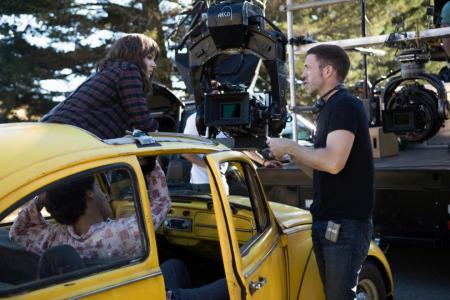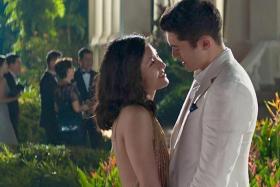Travis Knight: I felt like a kid making Bumblebee
Director relives childhood making Transformer film
Travis Knight made his directorial debut two years ago with the Oscar-nominated animation Kubo And The Two Strings.
And now, the 45-year-old US filmmaker and chief executive of animation studio Laika has been entrusted with Bumblebee, the latest instalment of the Transformers franchise.
Opening here tomorrow, the spin-off sees fan favourite Autobot Bumblebee on the run in the year 1987 and finding refuge in a junkyard in a California town.
When 18-year-old Charlie (Hailee Steinfeld) discovers and revives him, she learns this is no ordinary yellow VW bug.
Movie studio Paramount Pictures had hoped Knight, the son of Nike's founder-chairman Phil Knight, would helm a character-driven take and bring a degree of intimacy and emotion.
And it looks like he has succeeded, with Bumblebee receiving a 96 per cent rating on Rotten Tomatoes.
Why did you love Transformers so much as a kid?
Just the sheer idea of them - that these space-age robots are hidden in plain sight among us. It is one of the things about the magic and charm of stop-motion, a technique I have devoted my life to. The primal quality it has is that it feels as if it is a child's plaything brought to life. This was a chance for me to breathe life into something I've loved since I was nine. It makes me feel like a kid all over again.
Fans went crazy about you directing Bumblebee because they loved Kubo And The Two Strings. Why do you think that is?
I was flattered by the reaction. I guess it is my general approach to storytelling. I think you can see that in the DNA of the company I started, Laika, where we try to tell stories that are an artful balance of darkness and light, intensity and warmth, humour and heart, spectacle and emotion. We always try to find a fusion of those things.
What is it about the character that makes people love Bumblebee so much?
Bumblebee was always the Transformer who had the greatest affinity for humanity, the one who had the deepest connection to people.
That was in the stories right from the beginning. Bee was the one who was most like us. Certainly he was the one who was most like me. By Transformers standards, he was small and wasn't particularly powerful. He was the most human.
How do you represent that on film?
You have to find a way for the audience to emotionally connect. I said (to my design team), "He has got to be the most expressive Transformer that has ever been seen on screen."
The team's approach was to put more and more detail into the character. And I was like, 'No, no, no - you're going about it the wrong way. It is not about adding more detail; it is about making sure the detail there is meaningful'. So we actually simplified, stripped things away.
And in doing that, our version of Bumblebee became a bridge between what (Hollywood producer-director) Michael (Bay) did (in his previous movies) and the original version of Bee from the 80s TV show."
Is that why you set this movie in the 80s?
That just made sense to me, that as we were telling an origin story we should go to the era these characters were born in. That's when I was exposed to them.
As someone who grew up in that era, I thought about the different touchstones. Obviously there's music, but there are's (Steven) Spielberg and the Amblin films. Bumblebee was a way for me to try to weave together these two things that I loved - Transformers and the Amblin films of the 80s. E.T. was very much my spirit animal.
What is it about Steinfeld that made her your protagonist? The pressure on that lead role is huge, right?
It's enormous. To carry one of these movies on your shoulders is a huge pressure. So whoever was going to be Charlie had to be exceptional.
I saw these two characters - Charlie and Bee - as warped, funhouse-mirror versions of each other, so they would feed off each other, nurture each other, and whatever the human character was going to do, the performance of the robot had to be as subtle, compelling, rich and emotionally satisfying. Bee needed to be an actor, not a visual effect.
At my very first pitch meeting, where I was discussing my vision for the film, I brought up just one name - Hailee Steinfeld. She is fearless, bold, and an actor of such great empathy that it is almost like a superpower for her.
Get The New Paper on your phone with the free TNP app. Download from the Apple App Store or Google Play Store now




